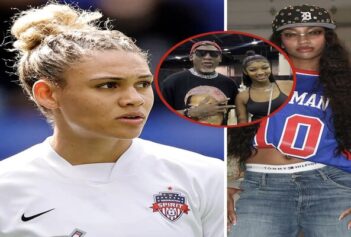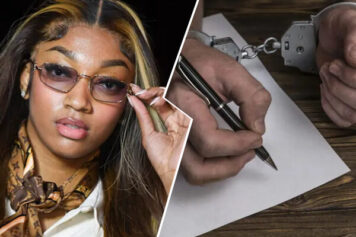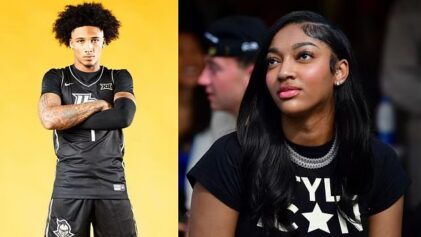The 2023 NCAA Division I Women’s Championship battle between Louisiana State University Tigers and the University of Iowa Hawkeyes are polarized even after LSU’s dominant win. The storylines went from LSU women’s basketball coach Kim Mulkey searching for LSU’s first championship and her fourth win to a battle of decency and culture among the players.
For LSU star Angel Reese, her in-game competitiveness stared media darling Caitlin Clark in the face, literally. Reese took a page out of former WWE star John Cena’s page book waving her hand repeatedly over her face while looking at Clark, a move Cena dubbed the “You can’t see me.” She then held her hand up and pointed to the ring finger letting Clark, Haweyes nation, and the world know that she expects her ring expeditiously.
The New Magic vs. Bird?
The energy surrounding the Reese and Clark adversarial narrative is now taking on elements reminiscent of another great NCAA rivalry, Magic Johnson vs. Larry Bird’s 1979 NCAA Division I basketball championship game. Johnson brought the first-ever men’s basketball championship to his Michigan State University like Reese did for LSU women’s basketball. The two star athletes were focused on winning in 1979, but their matchup was polarized by the racial tropes surrounding them and the existing polarization in the nation.
Reese’s “you can’t see me” move was immediately railed on by many in the media and those looking for a fight on Twitter as something uncouth or unbecoming of a respectful athletic competitor. But Clark made the same move during her standout performance in the Hawkeyes’ Elite Eight win in March Madness.
Clark put on a shooting clinic, finishing with 41 points, 12 assists, and ten rebounds while shooting 8/14 from three, and after her sixth trey-ball, she mimicked Cena’s WWE diss at Louisville. The social media attention was wide but the reaction was different.
Cena even gave her a shout-out on Twitter for the move.
“Even if they could see you…they couldn’t guard you! Congrats on the historic performance @CaitlinClark22 and to @IowaWBB on advancing to the Final Four!,” Cena posted.
A Tale Of Two Disses
For many, it was a tale of two disses and the only thing that separated the two was the color and culture of the person being competitively disrespectful.
“But here’s the reality of the situation. She (Caitlin Clark) instigated this kind of stuff,” Smith said on Monday’s episode of First Take. “Let’s call it what it is. She was waving. She was doing the Cena. How about what she did to Raven Johnson? She didn’t just go into the lane and not guard her against South Carolina in the national semifinal. She waved her off. She didn’t mind being disrespectful. So why is it that we’re hesitant to bring that up?
“These women are highly competitive. They’re highly gifted and skilled, but I’m going a step further with this. We all know that there’s a white-black issue here because the fact of the matter is when CaitlIn did it, people were celebrating it, and they were talking about nothing but her greatness. But then the second a sister stepped up and threw it back in her face, now you have half the basketball world saying, ‘well, you know what, that’s not the classiest thing to do, that’s not the way that she should act.’ It was the exact same thing.”
Reese told the world exactly how she felt during the postgame press conference. After the game, Reese argued the criticism is more profound than a competitive championship moment but that she feels it is tied to how she is perceived overall.
Black Without Apology
“All year I was critiqued about who I was. … I don’t fit the narrative, Reese said to the media post-game. “I don’t fit in a box that y’all want me to be in. I’m too hood. I’m too ghetto. Y’all told me that all year. But when other people do it, y’all say nothing. So this was for the girls that look like me, that’s going to speak up on what they believe in. It’s unapologetically you.
“That’s what I did it for tonight. It was bigger than me tonight. It was bigger than me. Twitter is going to go on a rage every time, and I’m happy. I feel like I’ve helped grow women’s basketball this year. I’m super happy and excited. So I’m looking forward to celebrating in the next season.”
Smith touched on the differentiating factor being that Reese’s taunt could be deemed “excessive,” which would be the critique alone.
“Now you can make an argument that if they’re doing excessive celebration in her face after the game is over, all right, then you can make that argument, but you have people complaining about it when she was doing it during the game,” Smith continued on Monday’s “First Take.”
Dawn Staley shed more light on the characterizations of the Black athletes on her South Carolina Gamecocks squad, who helped cement Clark’s apparent greatness with Iowa’s surprise defeat of the formerly undefeated team to make it to the championship game. When discussing her team’s defense, the term “bar fight” was the primary point of contention, but Staley said that the media only amplified that perception throughout the season.
Angel Reese and Caitlin Clark might not be the new version of Magic and Bird pre-NBA, but they show that not much has changed since those two played and split the nation between Blacks and whites. Both will still have the opportunity to do it again next year.
More news from our partners:



